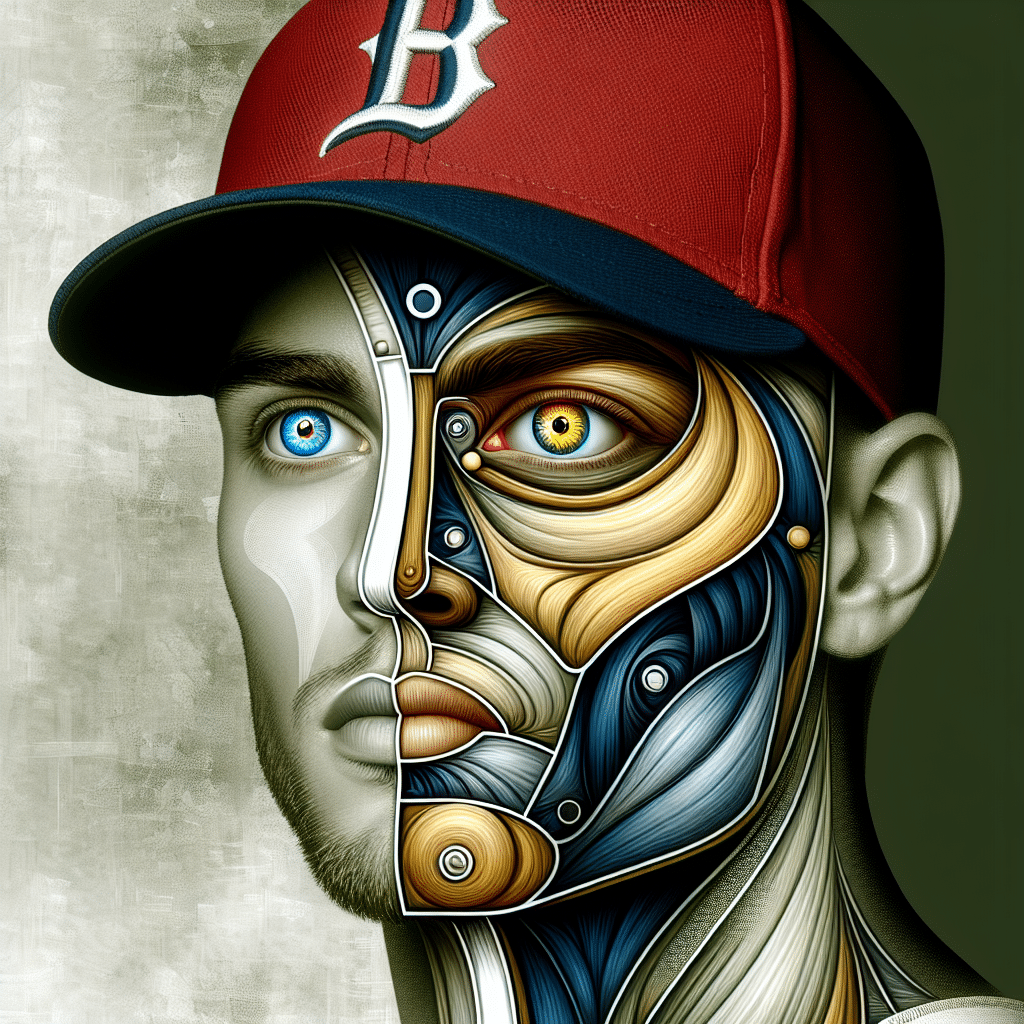Baseball Players and Eye Color
When you think of baseball, eye color probably isn’t the first thing that pops into your head. But believe it or not, it can make a difference. About 16% of Americans have light-colored eyes, and this can spell trouble for athletes like Bryce Harper, who has light-blue eyes.
Players with lighter eyes often struggle more with glare from the sun and light sensitivity. This happens because they lack pigment in their retinas, making it tougher to see the baseball or spot the seams and movement of pitches. These challenges can affect a player’s game.
But don’t count them out just yet. Bryce Harper, for example, has found a way to tackle these issues head-on. He started wearing new photochromic contact lenses that adjust to changing light. These lenses, similar to Transitions glasses, help reduce the impact of bright light on his eyes. Fun fact: when Harper steps outside, his eye color shifts from blue to brown thanks to these lenses.
With these high-tech lenses, Harper believes his vision during games will get a big boost. The lenses darken in bright light, helping him avoid squinting and improving his ability to see clearly. This can be a game-changer in crucial moments, like making contact with the ball or avoiding misreads (USA Today).
Eye color might not be the only thing that determines a player’s success, but it’s interesting to see how players like Harper tackle their unique challenges. With new tech and innovative solutions like photochromic lenses, players can fine-tune their vision and bring their A-game. Eye color is just one piece of the puzzle, but it’s a piece that players like Harper are mastering.
Bryce Harper’s Eye Color
As a die-hard baseball fan, I get it—sometimes the most burning questions aren’t about a player’s stats but the quirky details, like their eye color. So, let’s talk about Bryce Harper’s eyes.
Harper’s Vision Challenges
Bryce Harper, with his jaw-dropping athletic skills, has a unique twist—his light blue eyes. These eyes make him pop on and off the field. But here’s the kicker: about 16% of Americans with light-colored eyes, like Harper, can have vision issues.
The lack of pigment in light-colored eyes can make it tough to track a baseball, spot the seams, and judge pitch movement. Plus, Harper’s blue eyes are more sensitive to sunlight, which can mess with his vision during games.
Changing Eye Color
To tackle these challenges, Harper’s got a cool trick up his sleeve. He wears photochromic contact lenses (USA Today). These high-tech lenses adjust to different light conditions, cutting down on glare.
What’s wild is that these lenses change his eye color from blue to brown when he’s outside. They darken in response to light, helping Harper see better in bright conditions. This tech not only boosts his vision but also adds a layer of mystery—fans never know what color his eyes will be.
So, next time you catch Harper on the field, check out his eye color. It’s not just his talent that’s captivating; his blue-to-brown eye shift is a game-changer too.
Bryce Harper’s Vision Journey
Bryce Harper’s eye care saga is a wild ride, with his vision being a game-changer on the baseball field. Harper’s been rocking contact lenses since eighth grade to fix his vision, but it hasn’t always been smooth sailing. Back in 2011, Harper told the Washington Post he was “blind as a bat” when he first joined the Washington Nationals.
Lately, Harper’s been tweaking his eye game to up his performance. He’s now using fancy photochromic contact lenses that adjust to light changes, cutting down on the glare. This tech, once only in Transitions glasses, is now in contacts. Harper even joked that his eyes change from blue to brown when he steps outside because of these lenses.
These new lenses are a big win for Harper. They darken in bright light, helping him avoid squinting and see better. This can make all the difference when he’s trying to hit a fastball or avoid a bad read (USA Today).
Harper’s already feeling the benefits during spring training. The lenses kick in fast, fully adjusting within 45 seconds. This quick shift helps him handle sunlight and stadium lights, which used to mess with his vision. Seeing clearly in all kinds of light gives him a leg up on the field.
By jumping on the latest contact lens tech, Harper’s sharpened his vision and tackled past issues. These eye care upgrades could boost his game and keep him at the top of baseball. Plus, these lenses aren’t just for the field—they make everyday life clearer for Harper too.
Performance Boosts
When it comes to upping your game in baseball, seeing clearly is a game-changer. Being able to track the ball can make or break a player’s performance. Let’s break down how players can sharpen their vision and why it matters on the field.
Sharpening Vision in Baseball
For baseball players, especially those with lighter eyes like Bryce Harper, vision can be a tricky thing. About 16% of Americans have light-colored eyes, which can cause problems because of less pigment in the retina. This can lead to more glare from the sun and light sensitivity, making it tougher to spot the baseball or see the seams and movement of pitches (The New York Times).
To tackle these issues, players like Harper have tried different fixes. One cool solution is photochromic contact lenses. These lenses change with the light and help cut down on glare. This tech, which has been around in Transitions glasses, is now being used in contact lenses.
Impact on Gameplay
Using photochromic contact lenses has made a big difference for Bryce Harper. These lenses switch from blue to brown in the light, helping him avoid squinting and see better in bright conditions. Harper thinks this boost in vision can be a game-changer during key moments, like hitting the ball or avoiding misreads (USA Today).
The lenses adjust quickly, taking about 45 seconds to fully change. This fast switch lets Harper keep his vision sharp without missing a beat, helping him react quickly to the fast-paced game. Whether it’s catching a fly ball or spotting the spin on a pitch, better vision can give players an edge.
By improving their vision, baseball players can boost their performance and help their team win. Whether it’s through special contact lenses or other vision tricks, players are always looking for ways to see better and play better. As the game changes, so do the tools and strategies that help players see the game in a whole new way.
Harper’s Contract and Future
While we chat about Bryce Harper’s eye color, let’s also dive into his career highlights and what lies ahead.
Harper’s Career Highlights
Bryce Harper, a name that echoes through Major League Baseball (MLB), is known for his raw talent and magnetic personality. Over the years, he’s racked up some serious accolades. Harper’s trophy shelf includes two National League (NL) Most Valuable Player (MVP) awards, proving he’s got the chops to back up the hype (Britannica).
Future Outlook and Expectations
Harper’s career hit a major milestone when he inked a 13-year, $330-million deal with the Philadelphia Phillies. This contract didn’t just make headlines; it made him one of the most sought-after free agents in baseball (USA Today). The Phillies are banking on Harper to be a game-changer, and he’s got the skills to deliver.
As a Phillie, Harper is expected to be a powerhouse. His batting skills, paired with his defensive abilities, make him a key player. Harper’s knack for hitting home runs, his sharp eye for pitches, and his all-around versatility have made him a fan favorite.
Looking forward, Harper’s career is set to be thrilling. He’ll face his old team, the Washington Nationals, in a much-anticipated two-game series after Opening Day. This reunion is bound to stir up a mix of cheers and jeers from the crowd. But Harper’s eyes are on the prize—helping the Phillies win.
With his talent and dedication, Bryce Harper’s future in MLB looks bright. Fans can expect more jaw-dropping moments, crucial plays, and a lasting legacy in baseball.
Keep an eye out for more updates on Bryce Harper’s journey and his quest for greatness on the field.



